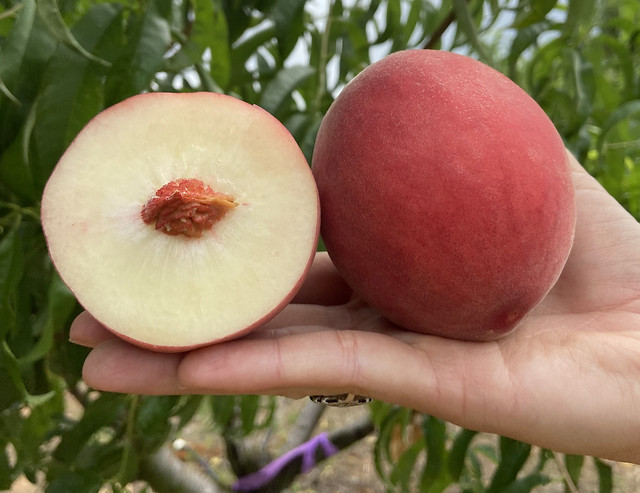Feb. 24, 2021
Arkansas Agricultural Experiment Station releases new white-flesh peach
By Fred Miller
U of A System Division of Agriculture
@AgNews479
Fast facts
- Ag Experiment Station releases new low-acid peach
- Whitewater joins lineup of white flesh peaches
- Earliest ripening Arkansas peach variety
(448 words)
Download related PHOTOS: https://flic.kr/s/aHsmUumF4p
FAYETTEVILLE, Ark. — Whitewater, a new peach from the Arkansas Agricultural Experiment Station’s fruit breeding program, features a low acid, white flesh fruit that ripens in June.
“This is a nice, early harvest addition to our white peach series,” said Margaret Worthington, fruit breeder for the Agricultural Experiment Station, the research arm of the University of Arkansas System Division of Agriculture. “It helps extend the harvest season for peach growers.”
Whitewater is the 11th publicly released peach from the fruit breeding program since it was founded by the late James N. Moore in 1964. It is the sixth low-acid, white-fleshed peach from the program. Moore’s overarching goal that continues today is to develop quality cultivated fruit varieties adapted to Arkansas growing conditions, Worthington said.
Its average harvest date of June 27 makes it the earliest peach cultivar from the Arkansas breeding program. That puts it five to 10 days before White Rock, the next earliest peach.
Worthington said Whitewater has a texture and flavor similar to White County, which was crossed with another experiment station peach, Souvenirs, to develop the new peach.
“Whitewater has an attractive white flesh without red flecking or discoloration,” Worthington said. “Its skin has a full red blush that averaged 86 percent coverage over nine years of observation.”
“Whitewater has a low-acid, aromatic flavor,” Worthington said. “It has a good size for an early-ripening peach. It has slow melting flesh and holds on the tree a bit longer than some other peaches. But it softens later for those who like melting flesh.”
Worthington added that Whitewater has good storage and handling characteristics, similar to other slow-melting flesh peaches like White County and Souvenirs. It’s intended for fresh market use and is well adapted to the growing climate in Arkansas and other southern states.
Chilling requirement was not determined, Worthington said, but she estimates it would be near 800 hours below about 44 degrees Fahrenheit, based on observations of budbreak and bloom in comparative plantings with test cultivars that have known chill requirements.
Flowering occurs in March, Worthington said, with an average full bloom date of March 16 at the testing location on the Fruit Research Station near Clarksville. “That’s comparable to Souvenirs,” Worthington said, “but 3-7 days earlier than other peach cultivars in the Division of Agriculture breeding program.”
Whitewater has moderate fruit and leaf resistance to bacterial spot, Worthington said.
Whitewater trees budded on Guardian® rootstock received acceptable ratings for vigor and overall tree health, Worthington said, though bacterial canker was observed. Crop load ratings and yield were comparable to other UA program cultivars.
Non-exclusive licenses for propagators are available. For information about licensing, contact Cheryl Nimmo at 479-575-3953 or by email at cnimmo@uark.edu.
Disclaimer: The listing of any commercial product in this publication does not imply endorsement of that product or discrimination against any other products by the University of Arkansas System Division of Agriculture.
To learn more about Division of Agriculture research, visit the Arkansas Agricultural Experiment Station website. Follow us on Twitter at @ArkAgResearch.
About the Division of Agriculture
The University of Arkansas System Division of Agriculture’s mission is to strengthen agriculture, communities, and families by connecting trusted research to the adoption of best practices. Through the Agricultural Experiment Station and the Cooperative Extension Service, the Division of Agriculture conducts research and extension work within the nation’s historic land grant education system.
The Division of Agriculture is one of 20 entities within the University of Arkansas System. It has offices in all 75 counties in Arkansas and faculty on five system campuses.
Pursuant to 7 CFR § 15.3, the University of Arkansas System Division of Agriculture offers all its Extension and Research programs and services (including employment) without regard to race, color, sex, national origin, religion, age, disability, marital or veteran status, genetic information, sexual preference, pregnancy or any other legally protected status, and is an equal opportunity institution.
Media Contact: Fred Miller
U of A System Division of Agriculture
Arkansas Agricultural Experiment Station
(479) 575-5647
fmiller@uark.edu
Related Links
